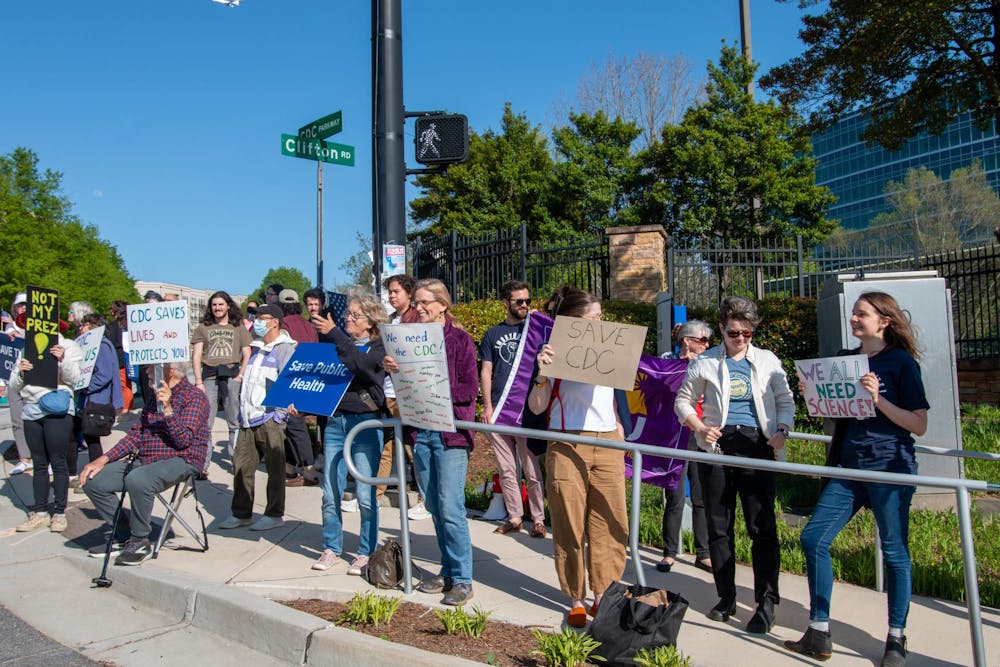EmoryUnite! members joined other community members for their weekly protest in front of the Centers for Disease Control and Prevention (CDC) headquarters on April 8. The graduate student union invited members and other Emory University students to join the regular demonstration in an Instagram post on April 5. At its peak the protest had about 75 people.
Since U.S. President Donald Trump took office, protesters have been intermittently gathering in front of the CDC to advocate against changes to federal public health infrastructure, including funding cuts to the U.S. Department of Health and Human Services’ agencies and programming.
While Emory students have participated in these protests in the past, EmoryUnite! called on their peers to take a stance against the recent firings within the CDC and other federal agencies at April 8’s protest.
“At Emory, we rely on the NIH, CDC, and other federally funded programs to conduct life-saving medical and public health research,” EmoryUnite! wrote in their post. “As graduate workers, we are already underpaid, overworked, and stretched thin.”
Alexis Smith (27G) and Imani Belton (28G) attended the protest because they said they were concerned about the impact recent funding cuts have had on graduate students at Emory and across the United States.
“We’re not necessarily working at the CDC, but all of this research is incredibly critical,” Belton said. “Making sure that we’re supporting each other where we can, even if it means just being a body and a presence in this space.”
Smith, a public health doctoral student, reflected on Emory’s position within the academic and research landscape, considering how students could use institutional resources to fight back against federal funding cuts.
“Emory, the [Rollins] School of Public Health, is now number two in the nation,” Smith said. “That doesn’t mean anything if we’re not able to wield that influence and wield that privilege for good. There’s a sense of responsibility as Emory students to stand up and use our voices and to be supported by the University.”
EmoryUnite! co-Chair Nathan Goldberg (26G) connected the graduate student union’s activism on Emory’s campus to the recent trend of firing federal workers seen in Trump’s second term. He described Trump’s actions as an “attack against unions at large” and other areas such as academia and public health research.
“We see, generally nationwide, an attack against organized labor, but also an attack against critical thought, our health care and economy,” Goldberg said.
Trump took action against federal worker unions on March 28, signing an executive order that, if executed, would end collective bargaining for unions of national security federal workers. Recently, on April 7, the American Federation of Government Employees and five other unions submitted a request for a temporary restraining order on Trump’s order.
Not only were graduate students looking to the federal government to make changes in reaction to the protest, but they also urged the University to take steps to support student workers.
“I would like to see more public statements from the University in support of the efforts that are happening at the grassroots level,” Belton said.
Goldberg added that he hoped to see more leadership from the University, particularly for students more susceptible to retaliation from the federal government.
“It also needs to do more with things like protecting its international student workers at a moment when international student workers are being abducted nationwide by ICE,” Goldberg said. “Emory really needs to step up and indicate that it’s an institutional leader in this community.”
Even in the face of an uncertain future for federal funding for academia, research funding and workers’ rights, Goldberg remained hopeful for the outcomes of grassroots organizing to combat the Trump administration’s actions.
“The best thing we could do as unions at the moment is come together and show solidarity with our fellow workers,” Goldberg said. “We’re not going to take this austerity measure that’s being put in place by the Trump administration.”

Ellie Fivas (she/her) (26C) is from Cleveland, Tenn., and is majoring in political science and history on the pre-law track. She manages the Wheel’s opinion section and the Editorial Board. When she is not writing for her political column Electoral Ellie, she works in prison education, leads a human rights club and works at the Emory Writing Center. In her free time, you can find her reading trashy romances and The New York Times, basking on the Quadrangle and doing crossword puzzles.









